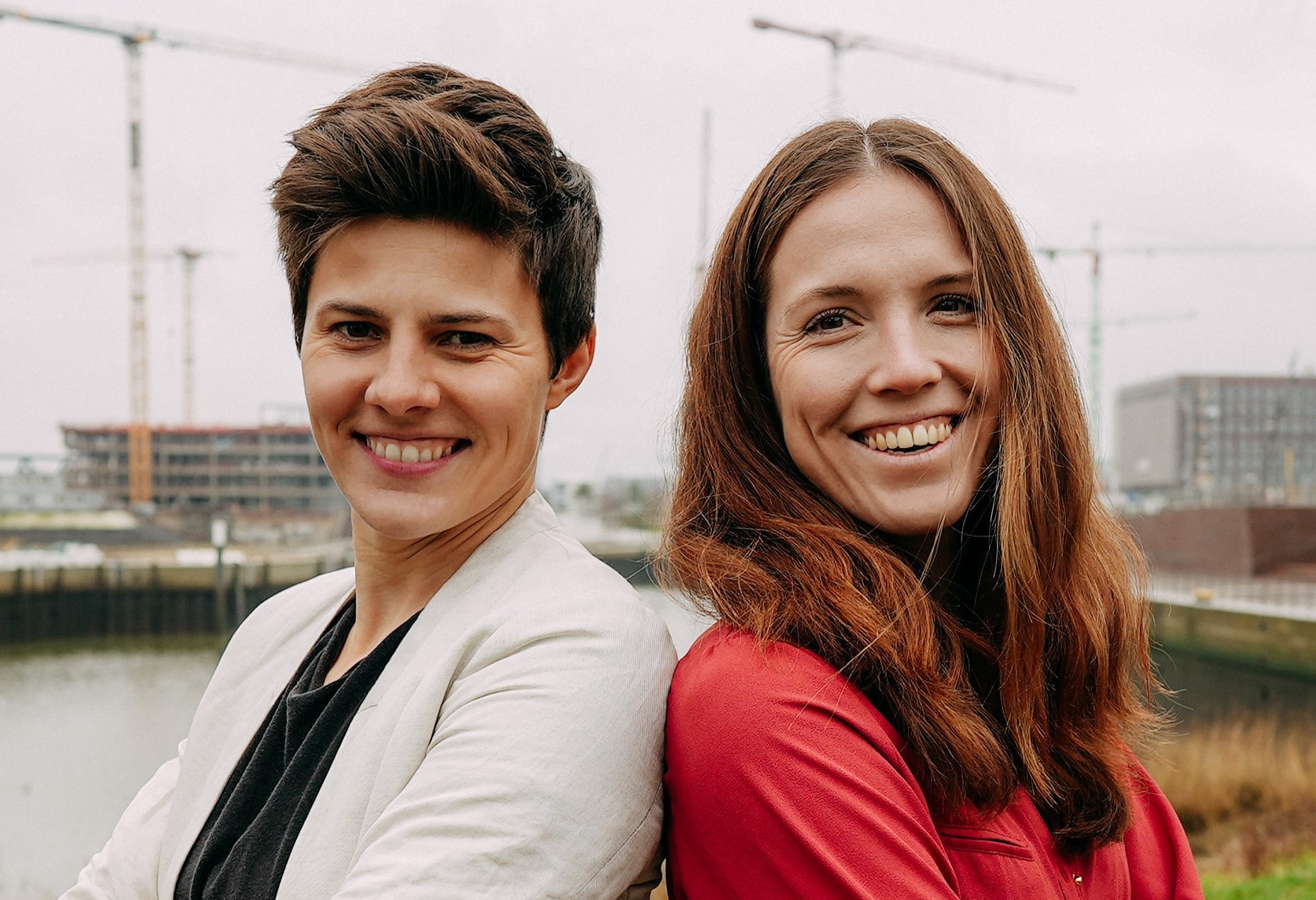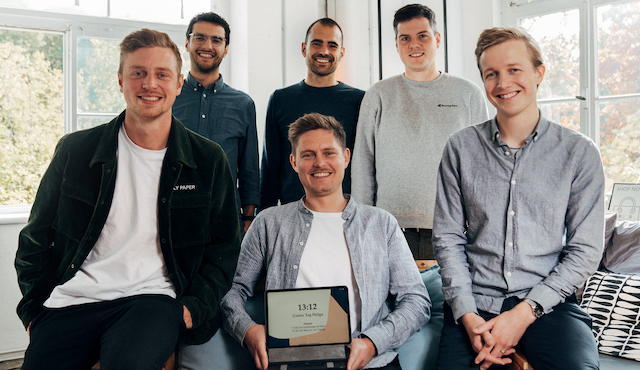
Five startups made it to the final round of the CONTENTshift accelerator. Their innovative ideas and concepts are sure to benefit the book industry.
How can we learn to more effectively deal with the burdens of everyday life, including stress and self-doubt? This question prompted psychologists Diana Huth and Theresa Frank to create their startup ACTitude. “We want to help people early on, before things get out of hand”, says co-founder Huth, who worked for a time in a rehab clinic. ACTitude offers preventive online courses that users are encouraged to take advantage of before any mental illness is diagnosed. The founders’ idea draws on the Acceptance and Commitment Therapy (ACT), a method used to help people accept situations they can’t change and instead focus on areas they can actively impact. Huth illustrates the approach with a simple example: if your plane or train has been cancelled, instead of whipping yourself into a rage that serves no one, why not first get an ice cream instead.
ACTitude’s psychological-educational courses are available in a variety of media, including videos, audio files and worksheets. “Our stress management course is certified, so it has specific guidelines and instructions. But our other courses use personalised learning paths, because there’s no single path that fits everyone, and each user should be able to forge their own unique path.” ACTitude’s target audience is quite broad: “In Germany alone, roughly 18 million people report being psychologically distressed in some way, but only three million actually seek professional help.” The founders are eager to cooperate with the book industry: “Especially in the realm of reference books, there are many authors with a lot of knowledge, and we consult with experts for our special courses”, explains Huth. “We see tremendous potential in connecting our two worlds. Linking media experts and the publishing community in this field would no doubt benefit both sides.”
Photo: © ACTitude

Photo: © enna systems GmbH

The problem is by no means new: in fact, it’s quite common, especially for seniors and people with disabilities, to be reluctant or unable to use smartphones and tablets due to a lack of motor skills. This makes it all the more astonishing that no practicable solutions have been found to address the problem to date. But now there’s enna, a startup eager to change all that. enna’s founders have developed a “dock” that functions as a simple interface between tablet and user. The dock is a control panel with a total of two buttons that allow, say, Grandma and Grandpa, to do such things as scroll through digital photos of their grandchildren, answer video and phone calls and watch YouTube videos. Other family members are the ones who take care of all remaining operations. When asked to explain the concept, co-founder Moritz Kutscherasaid: “It’s a bit like having your own social media network”.
All relevant data is stored in the Cloud and accessed by means of “enna Cards”, which the user simply lays down on the space in the middle of the dock. The content is curated either by enna or by the users’ family members, who can either purchase the content directly or sign up for a monthly subscription containing the content, dock, app and, if necessary, a tablet. enna was very well-received in a recent test phase involving nursing homes, and in July, the startup will also take on the B2C market. Kutschera has no doubt that enna has a bright future: “There’s so much content out there – and people forget how many others aren’t able to enjoy it. Our mission is make it possible for people to be able to move freely and autonomously in the digital world.”
At the height of the pandemic, when our freedom of movement became massively limited, Johannes Wöhler knew he was going to have to get creative to keep his children occupied. But how can parents transform their home into an adventure playground? Faced with this challenge, Wöhler drew on his background in software development and designed an app called Heimsafari. The app functions as a part-digital, part-analogue scavenger hunt. “The basic idea is that parents print out and hide pieces of paper containing puzzles and/or riddles, which the children then have to find and solve using Heimsafari”, explains Wöhler. Players are asked to solve a number of puzzles before they’re able to decipher the code and ultimately enter it into the app. Of course, these kinds of scavenger hunts are most easily done in a house or garden, but the app also has options for smaller flats where users play the game on a table.
To date, Heimsafari offers three different adventure stories that take roughly one to one-and-a-half hours to solve. The target group is kids of primary school age, but Wöhler is eager to extend the scope even further and expand to areas beyond the home: “I can imagine collaborating with zoos and museums. Educators could also use the app in schools, for example, when regular lessons are done.« Wöhler’s long-term outlook involves cooperating with publishers to develop adventures set in the worlds of well-known books and to develop stories with non-fiction themes. A series involving animal detective stories is already in the works. Heimsafari’s success continues to inspire him: the app has already been downloaded 6,000 times, with more than 1,200 stories played through and all puzzles solved.
Photo: © Dominique Brewig

Photo: © Lars Beekman

How can we get more people excited about reading again? It’s a question being asked not only by the entire book industry, but also by the team around Niels ’t Hooft at the Dutch app Immer. Immer is a play on words involving the Dutch and German word “immer” (meaning “always“) and the English word “immersion”, which is also used in Dutch and German. The app’s mission is to make it easier to read books on smartphones. “Publishers put a lot of effort into designing books, but then they just convert the physical copy into a digital file without any attention to detail”, says founder ’t Hooft.
The advantage of the Immer.App in comparison to conventional e-books or PDFs is that the startup developed a typography that makes the text easier to read on a small screen, including smaller text portions and contextual markers. Immer.App’s simple navigation makes it easy for users to maintain an overview of a book and browse through it. “Our goal is to make the digital reading experience as good as it is on paper, maybe even better.” And, last but not least, the startup is eager to remove any “fear” people have of thick books by displaying the text in small portions only. This way, readers can immerse themselves in a book for 15 minutes – in between doing something else or when they’re on the road – “and before they know it, they’ll have finished an entire chapter”. After an extended testing phase involving 10,000 participants, the Immer.App will finally make its way to market this summer. In the Netherlands, the startup is already working with all major publishers, offering their e-books for sale in the app’s own store. And now the team is hoping to garner interest from German publishers.
Whether you’re competitive or playful – QuizCo has something for all types of learners. Maximilian Friedrichgot the idea for his app a few years ago during a tutoring session, when he noticed his students preferred playing “Quizduell” than studying in more traditional ways. His solution to this quandary was to use so-called gamification to impart knowledge. “We developed an AI that converts PDFs, websites and videos into content summaries – but also into flashcards, quiz questions and multiple-choice questions”, explains Jacob Cordts, QuizCo co-founder with Wiebke Barth and Maximilian Friedrich. Their goals are to make learning more sustainable and to anchor knowledge more firmly in the learner’s long-term memory. According to QuizCo, the best way to achieve these goals is by making sure learners are having fun and by triggering their competitive spirit.
The 17-person team at QuizCo specialises in companies interested primarily in the economic aspect of this approach, i.e., the ways it allows them to save time, money and employee training. But the software is also very useful to universities: “For example, scripts, presentations and book chapters can be converted into preparatory lessons in advance of exams.” The startup has been so successful that they’ve now joined with a partner and set their sights on the markets in Australia and New Zealand. In the realm of publishing, QuizCo is eager to generate additional digital offerings for books. As Cordts notes: “There’s so much material out there. We just need to establish a connection to one another.”
Text: Isabella Caldart
Photo: © Philipp Hannappel
